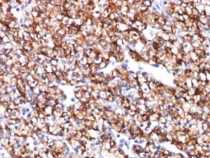ARG57725
anti-CA9 / Carbonic Anhydrase 9 antibody [CA9/781]
anti-CA9 / Carbonic Anhydrase 9 antibody [CA9/781] for IHC-Formalin-fixed paraffin-embedded sections,Western blot and Human
Overview
| Product Description | Mouse Monoclonal antibody [CA9/781] recognizes CA9 / Carbonic Anhydrase 9 |
|---|---|
| Tested Reactivity | Hu |
| Tested Application | IHC-P, WB |
| Host | Mouse |
| Clonality | Monoclonal |
| Clone | CA9/781 |
| Isotype | IgG2b, kappa |
| Target Name | CA9 / Carbonic Anhydrase 9 |
| Antigen Species | Human |
| Immunogen | Recombinant Human Carbonic Anhydrase 9 protein. |
| Conjugation | Un-conjugated |
| Alternate Names | EC 4.2.1.1; MN; CAIX; pMW1; Carbonic anhydrase 9; Carbonic anhydrase IX; RCC-associated antigen G250; Membrane antigen MN; P54/58N; Carbonate dehydratase IX; Renal cell carcinoma-associated antigen G250; CA-IX |
Application Instructions
| Application Suggestion |
|
||||||
|---|---|---|---|---|---|---|---|
| Application Note | * The dilutions indicate recommended starting dilutions and the optimal dilutions or concentrations should be determined by the scientist. | ||||||
| Observed Size | ~ 50 kDa |
Properties
| Form | Liquid |
|---|---|
| Purification | Purification with Protein G. |
| Buffer | PBS, 0.05% Sodium azide and 0.1 mg/ml BSA. |
| Preservative | 0.05% Sodium azide |
| Stabilizer | 0.1 mg/ml BSA |
| Concentration | 0.2 mg/ml |
| Storage Instruction | For continuous use, store undiluted antibody at 2-8°C for up to a week. For long-term storage, aliquot and store at -20°C or below. Storage in frost free freezers is not recommended. Avoid repeated freeze/thaw cycles. Suggest spin the vial prior to opening. The antibody solution should be gently mixed before use. |
| Note | For laboratory research only, not for drug, diagnostic or other use. |
Bioinformation
| Database Links | |
|---|---|
| Gene Symbol | CA9 |
| Gene Full Name | carbonic anhydrase IX |
| Background | Carbonic anhydrases (CAs) are a large family of zinc metalloenzymes that catalyze the reversible hydration of carbon dioxide. They participate in a variety of biological processes, including respiration, calcification, acid-base balance, bone resorption, and the formation of aqueous humor, cerebrospinal fluid, saliva, and gastric acid. They show extensive diversity in tissue distribution and in their subcellular localization. CA IX is a transmembrane protein and is one of only two tumor-associated carbonic anhydrase isoenzymes known. It is expressed in all clear-cell renal cell carcinoma, but is not detected in normal kidney or most other normal tissues. It may be involved in cell proliferation and transformation. This gene was mapped to 17q21.2 by fluorescence in situ hybridization, however, radiation hybrid mapping localized it to 9p13-p12. [provided by RefSeq, Jun 2014] |
| Function | Reversible hydration of carbon dioxide. Participates in pH regulation. May be involved in the control of cell proliferation and transformation. Appears to be a novel specific biomarker for a cervical neoplasia. [UniProt] |
| Calculated MW | 50 kDa |
| PTM | Asn-346 bears high-mannose type glycan structures. [UniProt] |
Images (2) Click the Picture to Zoom In
-
ARG57725 anti-CA9 / Carbonic Anhydrase 9 antibody [CA9/781] IHC-P image
Immunohistochemistry: Formalin-fixed and paraffin-embedded Human renal cell carcinoma stained with ARG57725 anti-CA9 / Carbonic Anhydrase 9 antibody [CA9/781].
-
ARG57725 anti-CA9 / Carbonic Anhydrase 9 antibody [CA9/781] WB image
Western blot: HCT116 cell lysate stained with ARG57725 anti-CA9 / Carbonic Anhydrase 9 antibody [CA9/781].







